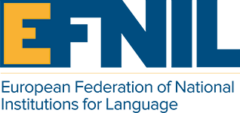2021 Spring – EFNIL Webinar
EFNIL Webinar: Reflections and Projects
24-25 March 2021
Programme
Reflections on EFNIL
- 14:00-14.10 Welcome and opening remarks (Johan Van Hoorde)
- 14.10-14.55 EFNIL as an organisation (Johan Van Hoorde and Åse Wetås)
- Opening remarks (goals, structure, expected results) (Åse Wetås)
- Introductory reflections: How should EFNIL develop as an organisation? (István Kenesei, Hungarian Research Institute for Linguistics)
- Discussion (chaired by Johan Van Hoorde).
Following up on discussions at previous conferences, we would like our members to reflect on the composition of EFNIL as regards the representations of languages and countries and their status within EFNIL.
The following questions will be addressed:
? Should EFNIL expand beyond the EU and accept countries outside the EU or even outside Europe?
? Should non-EU-members or associated members have the same number of votes as full EU-members?
? Should regional or minority languages be represented in EFNIL?
? How can we reflect the diversity of our members in EFNIL’s administrative functions and projects – e.g., from a geographical point of view, in terms of numbers of speakers, in terms of language families, etc.
Depending on the indications given by the General Assembly during the discussion, the executive committee will prepare these topics for a final decision at the next meeting in autumn 2021.
- 14.55-15.30 EFNIL and its projects
- Opening remarks (goals, structure, expected results) (Åse Wetås)
- Introductory reflections: Overview of existing projects and new projects suggested by members in the member consultation of spring 2020 (Johan Van Hoorde)
- Discussion (chaired by Johan Van Hoorde).
The following questions will be addressed:
? How can we strengthen and promote the existing projects?
? What new projects should we develop?
Based on the indications and priorities given in the discussion, the executive committee will prepare project activities to be submitted to the General Assembly at the next meeting in autumn 2021 as a part of the activity plan for 2022.
- 15.30-15.40 Break
- 15.40-16.10 EFNIL as a political influencer
- Opening remarks (goals, structure, expected results) (Åse Wetås)
- Introductory reflections: How to increase EFNIL’s impact on national and European policies / policy makers? (Claire-Lyse Chambron, Délégation à la langue française – France and Charlotta af Hällström-Reijonen, Institute for the Languages of Finland)
- Discussion (chaired by Johan Van Hoorde).
The following question will be addressed:
? How can EFNIL help to create language policy awareness and influence policy makers both at the level of the national states and at the level of the European institutions?
Based on the ideas and suggestions given in the discussion, the executive committee will present a strategy note regarding EFNIL as a policy influencer to be submitted to the General Assembly at the next meeting in autumn 2021.
- 16.10-16.45 Information about the EU-project European Language Equality (ELE)
- Introduction to ELE (Sabine Kirchmeier)
- How can EFNIL members contribute? (Sabine Kirchmeier)
- Questions and discussion (chaired by Tamás Váradi).
The ELE project aims at providing the EU with a roadmap for achieving digital language equality for all languages in Europe by 2030. As one of the partner organisations in the project consortium, EFNIL will contribute by collecting information on the status for language technology in its member countries, and by providing ideas and feedback at different stages of the proposed roadmap in close cooperation with all member institutions.
EFNIL projects
- 10:00-11:30: ELM – European Language Monitor
- Welcome and opening remarks (Nina Teigland)
- ELM 4 – introduction and results (Sabine Kirchmeier)
- ELM website demo (Sabine Kirchmeier)
- From ELM 1 to ELM 4 – how can we compare the results (Sabine Kirchmeier)
- Data collection for ELM 5 (Jennie Spetz)
- Promotion of ELM (Cecilia Robustelli, Annemieke Hoorntje)
- Questions and discussion (chaired by Nina Teigland).
ELM provides insight into language legislation and language planning in Europe. It is a detailed and up to date database containing quantitative and quantitative data, links to rulings and legislation and other types of documentation collected by EFNIL members.
Please visit the ELM webpages on: http://www.efnil.org/projects/elm and esp. the ELM 4 survey on: https://juniper.nytud.hu/elm4/index.
The members of the ELM group are:
Sabine Kirchmeier, project coordinator (Denmark), Cecilia Robustelli (Università degli Studi di Modena e Reggio Emilia and Accademia della Crusca, Italy), Jennie Spetz (Institut för Språk och Folkminnen, Sweden), Nina Teigland (Språkrådet, Norway), Annemieke Hoorntje (Taalunie – Union for the Dutch Language).
- 14:00-15:30: ELIPS – survey – results – further perspectives
- Welcome and opening remarks (Júlia Choleva, chair)
- General introduction of the ELIPS project and website demo (Aino Piehl)
- Presentation of survey results (Katrin Hallik – Aino Piehl – Cecilia Robustelli)
- Conclusions & recommendations (Johan Van Hoorde)
- General discussion (chaired by Júlia Choleva).
ELIPS is the acronym of European Languages in the Public Space and deals with the use of the national languages of the European countries in the field of government, legislation, and public administration.
Please visit the ELIPS survey on: https://juniper.nytud.hu/elips/browse#. Please keep in mind that this is still work in progress. Do not share this information with others until it is officially put online.
Members of the ELIPS project group are:
Aino Piehl (co-ordinator, Institute for the Languages of Finland), Katrin Hallik (Institute of the Estonian Language), Cecilia Robustelli (Università degli Studi di Modena e Reggio Emilia – Accademia della Crusca), Júlia Choleva (Ľudovít Štúr Institute of Linguistics – Slovak Academy of Science) and Johan Van Hoorde (Taalunie – Union for the Dutch
Language).
